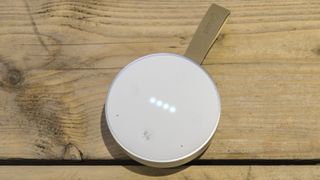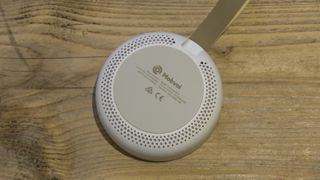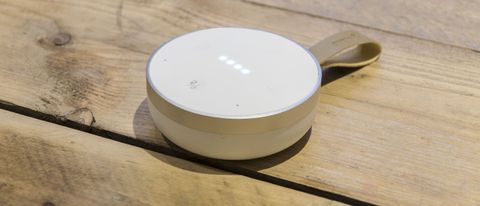TechRadar Verdict
A Google Home Mini alternative that you can bring anywhere, the TicHome Mini justifies its slightly more expensive asking price.
Pros
- +
Portable
- +
All the Google smarts you'd expect
- +
Splashproof
Cons
- -
Needs a better battery indicator
- -
Speakers are simply fine
Why you can trust TechRadar
The smart speaker revolution is in full swing. The Amazon Echo and Echo Dot opened the floodgates for voice-activated speakers, with a next-gen wave set to release before Christmas, and Alexa now appearing in loads of third-party speakers. Google got in on the action with its Assistant-powered Google Home, and Google Home Mini. And it too now has opened up its voice assistant to third party speaker manufacturers.
One of the first companies to dive in with Google’s helper is Chinese brand Mobvo with the TicHome Mini. Costing $99 (around £75 / AU$130), it is able to perform any task the Google Home can through the power of voice alone, and brings with it a killer unique selling point: portability. But have other compromises been made to make it pocketable?
Design
The TicHome Mini looks like a stout hockey puck. Available in a range of colors including teal, pink, black and white (which we’ve been testing), each stands just 43mm tall, with a 110mm diameter. Silver edging is found across the range, with each featuring four physical buttons along the top side.
There are volume up and down buttons, a power / mic mute button, and a button to open up the dialogue between you and the speaker's Assistant. But, aside from the power button, you’ll probably hardly ever use these buttons – with a simple “OK Google” or “Hey Google” voice command, you can perform all these actions through voice alone.
At just 276g, it’s a comfortably portable speaker that can easily be moved from room to room. And that’s where the TicHome Mini really separates itself from other Google smart-assistant speakers currently available. Armed with a 2,600mAh battery, it’ll last for six hours between charges away from a mains power supply.

That means, with its handy attached leather carry strap, you can take the TicHome Mini with you wherever you go. It was great to be able to leave it on a bedside table, ask it for a daily schedule and news report, then fire up a Spotify playlist and safely take it into the shower, safe in the knowledge its IPX6 waterproofing would protect its delicate innards. Its portability is a feature that the new Google Home Mini doesn’t have.
The TicHome Mini has a tidy design overall, with its cupped base helping to expose the diminutive 3W speaker’s grille, rather than it firing down into a surface. The leather strap proved surprisingly useful too – we regularly left the speaker dangling off bathroom hooks, for instance.
If there are two detracting points, it’s the fact Mobvoi have stuck with an outdated microUSB charging point rather than a more convenient, newer USB-C connection, and there’s no way to accurately see precisely how much battery is left. A four LED lighting array on the top side of the unit shows when a voice command is being recognised, and can also display a rough estimate of how much battery is left. But with no screen to interact with, and a smart speaker expected to stay on and ready for any voice-activated whim, the battery has the illusion of depleting more quickly than you’d expect.
The other issue is more an annoyance of the Google Assistant system than the TicHome Mini itself – if you’re away from your home’s Wi-Fi connection (802.11a/b/g/n dual band is supported), the Google Assistant features no longer work. There’s Bluetooth and NFC support for hooking up a smartphone for music, but it limits the usefulness of the smart features anywhere out of range of your home.
Performance
Despite its diminutive size, the TicHome Mini performed admirably both in picking up voices and the Google trigger word, and outperformed expectations with its speaker quality too.
For an in-depth look at what the Google Assistant can do in the home, check out our Google Home review. But as a quick overview, you can ask Google’s Assistant to do all manner of tasks – with a natural, conversational command, you can get it to play specific music from your streaming service of choice, get an update on your schedule, check the weather, get an overview of a subject from Wikipedia, set reminders and timers, and control all sorts of Google-compatible smart home gear.

The TicHome Mini, in terms of smarts, makes a great alternative to the Google Home or Google Home Mini then, with its mic array doing well to pick up our voices across a room. Like a smart speakers we’ve tested so far, it can struggle a bit when ambient noise is loud – particularly when playing music from the device. But its down-facing speakers are at least pointed away from its top-mounted mics. Against the competition, you can’t complain.
Audio performance is admittedly weaker, but better than what you may imagine from a speaker this size. The speaker outputs at 3W, but actually feels a little louder than that perhaps thanks to the wraparound speaker grille on its underside. It’s not a terribly detailed soundstage, but there’s reasonable depth to the bass for a speaker this size, and to our ears it’s a step above, say, the Amazon Echo Dot, before even the flexibility of its portability is taken into account.
We liked
The TicHome Mini offers a portable convenience that, outside of attaching a smart speaker to an external battery, its competition just can’t match at the moment. That’ll change before Christmas, when a suite of new smart-enabled speakers hit the shops, some of which will also offer battery power. But for now, it’s unique, and neat enough in its own right to be worth your attention.

We disliked
This is not a speaker that will replace your hi-fi, and would struggle to compete against the best Bluetooth speakers on the market were it not for its smart-enabled features. Annoyingly, its smart features slip away when removed from your Wi-Fi network too, leaving you with an unremarkable Bluetooth speaker.
Final verdict
The Mobvoi TicHome Mini, despite its diminutive size, gives a good account of itself, and shows that with a little thought manufacturers can make some interesting design decisions around Google’s Assistant.
Its speaker is so-so, but performs better than its size would suggest, while its ability to take voice commands accurately speaks to the quality of its microphones. It becomes less useful when away from your home network, but the convenience of a wire-free smart speaker, free to move around your house, is surprisingly welcome when in use.
The real question comes with price-versus-form factor: the Google Home Mini is similarly small and roughly half the price, but without the portability. The TicHome Mini does enough to justify the extra price, but only if you’re keen on being able to move a single speaker around your home.
It certainly undermines the assumption that Google and Amazon’s smart speaker strategy seems to be pushing towards – that anyone invested in a smart home ecosystem will need multiple devices dotted around the house. With the TicHome Mini, or a similarly portable option, just the one will do just fine.
Gerald is Editor-in-Chief of iMore.com. Previously he was the Executive Editor for TechRadar, taking care of the site's home cinema, gaming, smart home, entertainment and audio output. He loves gaming, but don't expect him to play with you unless your console is hooked up to a 4K HDR screen and a 7.1 surround system. Before TechRadar, Gerald was Editor of Gizmodo UK. He is also the author of 'Get Technology: Upgrade Your Future', published by Aurum Press.


